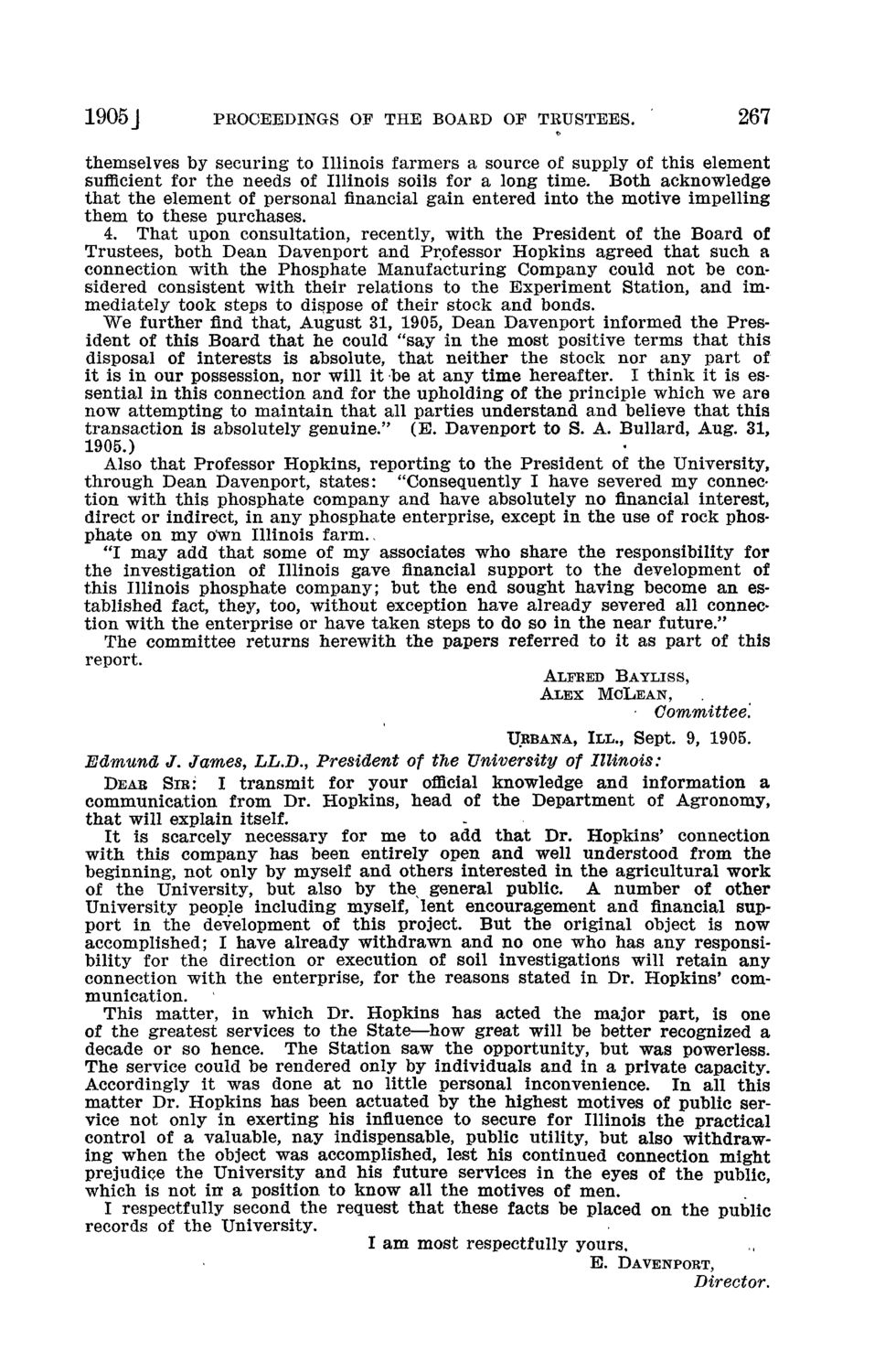| |
| |
Caption: Board of Trustees Minutes - 1906
This is a reduced-resolution page image for fast online browsing.

EXTRACTED TEXT FROM PAGE:
1905J PROCEEDINGS OF THE BOARD OF TRUSTEES. 267 themselves by securing to Illinois farmers a source of supply of this element sufficient for the needs of Illinois soils for a long time. Both acknowledge that the element of personal financial gain entered into the motive impelling them to these purchases. 4. That upon consultation, recently, with the President of the Board of Trustees, both Dean Davenport and Professor Hopkins agreed that such a connection with the Phosphate Manufacturing Company could not be considered consistent with their relations to the Experiment Station, and immediately took steps to dispose of their stock and bonds. We further find that, August 31, 1905, Dean Davenport informed the President of this Board that he could "say in the most positive terms that this disposal of interests is absolute, that neither the stock nor any part of it is in our possession, nor will it be at any time hereafter. I think it is essential in this connection and for the upholding of the principle which we are now attempting to maintain that all parties understand and believe that this transaction is absolutely genuine.'' (E. Davenport to S. A. Bullard, Aug. 31, 1905.) Also that Professor Hopkins, reporting to the President of the University, through Dean Davenport, states: "Consequently I have severed my connection with this phosphate company and have absolutely no financial interest, direct or indirect, in any phosphate enterprise, except in the use of rock phosphate on my own Illinois farm., "I may add that some of my associates who share the responsibility for the investigation of Illinois gave financial support to the development of this Illinois phosphate company; but the end sought having become an established fact, they, too, without exception have already severed all connection with the enterprise or have taken steps to do so in the near future." The committee returns herewith the papers referred to it as part of this report. ALFRED BAYLISS, ALEX MCLEAN, Committee. URBANA, I I I . , Sept. 9, 1905. Edmund J. James, LL.D., President of the University of Illinois: DEAR SIR: I transmit for your official knowledge and information a communication from Dr. Hopkins, head of the Department of Agronomy, that will explain itself. It is scarcely necessary for me to add that Dr. Hopkins' connection with this company has been entirely open and well understood from the beginning, not only by myself and others interested in the agricultural work of the University, but also by the general public. A number of other University people including myself, lent encouragement and financial support in the development of this project. But the original object is now accomplished; I have already withdrawn and no one who has any responsibility for the direction or execution of soil investigations will retain any connection with the enterprise, for the reasons stated in Dr. Hopkins' communication. This matter, in which Dr. Hopkins has acted the major part, is one of the greatest services to the State—how great will be better recognized a decade or so hence. The Station saw the opportunity, but was powerless. The service could be rendered only by individuals and in a private capacity. Accordingly it was done at no little personal inconvenience. In all this matter Dr. Hopkins has been actuated by the highest motives of public service not only in exerting his influence to secure for Illinois the practical control of a valuable, nay indispensable, public utility, but also withdrawing when the object was accomplished, lest his continued connection might prejudice the University and his future services in the eyes of the public, which is not in a position to know all the motives of men. I respectfully second the request that these facts be placed on the public records of the University. I am most respectfully yours, E. DAVENPORT, Director.
| |